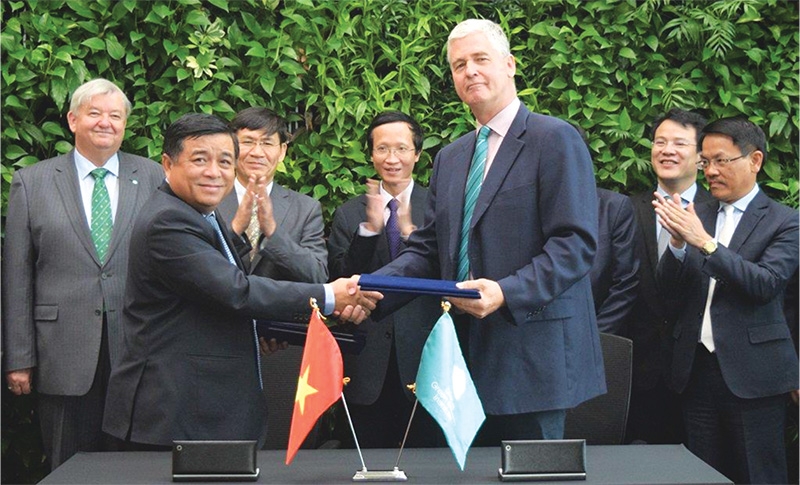Upgrading green strategies for tomorrow’s world
 |
| Hanh Le, country representative of the GGGI in Vietnam |
Vietnam has undergone rapid growth since the onset of doi moi in 1986. Gross national income per capita has increased from $130 in 1990 to $2,540 in 2019. Whilst the pandemic has a dampening effect on the economy, Vietnam is one of few countries in the world that will record a positive growth rate in 2020.
In the first 11 months of 2020, according to the Ministry of Planning and Investment, foreign-invested projects disbursed $17.2 billion, equivalent to 97.6 per cent over the same period last year – an impressive rate given the staggering impacts of the pandemic on the global economy.
However, Vietnam is also increasingly faced with challenges to green growth and sustainable development. The country is one of the most vulnerable in the world to climate change while its dependency on coal-based power generation has led to rising emissions and deteriorating air quality. This year alone, Vietnam recorded one of its worst droughts in June, with the worst floods sweeping across the country only in October.
Recognising these challenges, the Vietnamese government is committed to building an inclusive, sustainable, green economy. The government submitted its target to reduce at least 9 per cent of greenhouse gas emissions in its recent Nationally Determined Contribution to the United Nations on climate change. The Ministry of Planning and Investment (MPI), tasked as the lead body on green growth policy, launched the Green Growth Strategy in 2012 and subsequent Green Growth Action Plan in 2014, aiming to promote sustainable consumption and production and increase green investments, while reducing those emissions.
In addition to domestic policy commitments, the government also joined the GGGI in 2012, an intergovernmental organisation with a mission to support its members on the transition to a green economy that is environmentally sustainable, ensures social inclusion, and reduces poverty.
Investments required to implement Vietnam’s Green Growth Strategy (VGGS) are estimated to amount at least to $30 billion. Increased public funding to green investment and engagement of the private sector are paramount to achieve VGGS targets. With such a pressing need, the GGGI and the MPI have collaborated to provide guidance to enhance public investments towards green and socially inclusive projects. Moreover, recognising the important role of the private sector, the MPI and the GGGI have worked together to help prioritise green credit for small- and medium-sized enterprises through a development fund to provide much needed support to these businesses – the backbone of the economy.
 |
| MPI Minister Nguyen Chi Dung and GGGI general director Dr. Frank Rijsberman signing an MoU in 2017 |
Building on the initial successes of the VGGS, the MPI is updating the strategy for the 2021-2030 period to respond to the current situation, domestically and globally, taking into account the impacts of the pandemic and the urgency of responding to climate change and transitioning to a green growth model. The government also sets out the priorities in continuing to improve the financial policy framework for sustainability and increasing private sector engagement in green investments. Within this context, digital transformation is also recognised as a critical tool for the state, businesses, and each individual to contribute to a more sustainable economy, to respond to the impacts of the pandemic, and to build back better.
According to estimates by the World Economic Forum, digital transformation has the potential to reduce 16 billion tonnes of CO2 globally during 2016-2025 in three industries alone – electricity, transportation, and logistics. Currently, many countries, especially the G20 ones, have integrated digital transformation and green growth into their overall strategies to achieve sustainable development goals. These holistic strategies cover all sectors of the economy, from green products and services, over energy, transport infrastructure, and smart manufacturing processes to intelligent environmental monitoring and natural resource management systems. These approaches are transforming the organisational structure and work practices in entire economies and societies.
For example, new technologies such as drones and satellite imaging have made data more accurate, helping assessments of extreme weather events or vulnerability mapping to be much more accessible for disaster-prone countries. These technologies can also help monitor and manage forestation and disaster risks.
Digital innovations are also seen in sustainable finance. Blockchain green bonds have been praised for their efficiency and credibility. According to a recent research by HSBC, digitalisation helps green bonds to be more fraud-proof and accessible to investors, while improving the verification of relevant impacts of projects.
The Internet of Things applications are increasingly relevant to our daily life and our businesses, from smart mobility to smart agriculture. Digitalisation has been one of the innovations that liberate the energy market, transforming consumers to become producers and enabling more renewable energy to enter into the mix, on and off-grid.
With such enormous potential, digital economy and sustainable development are on top of the government’s policy agenda. The implementation of sustainable digital transformation in the next five years is critical for economic recovery and for protecting people. As such, the GGGI and the MPI will build on their existing successful collaboration and support Vietnam to implement the new VGGS 2021-2030, especially through promoting sustainable digital transformation.
Together with the MPI, the GGGI will assess sustainable digital transformation in the context of Vietnam’s current policy framework. In parallel, the GGGI will bring its strong green investment expertise, including through its global Greenpreneurs programme, and support businesses to mobilise investments for their green digital solutions, such as energy efficiency, renewable energy, and mobility, among others.
What the stars mean:
★ Poor ★ ★ Promising ★★★ Good ★★★★ Very good ★★★★★ Exceptional
Themes: MPI in partnership
Related Contents
Latest News
More News
- Masan Consumer names new deputy CEO to drive foods and beverages growth (February 23, 2026 | 20:52)
- Myriad risks ahead, but ones Vietnam can confront (February 20, 2026 | 15:02)
- Vietnam making the leap into AI and semiconductors (February 20, 2026 | 09:37)
- Funding must be activated for semiconductor success (February 20, 2026 | 09:20)
- Resilience as new benchmark for smarter infrastructure (February 19, 2026 | 20:35)
- A golden time to shine within ASEAN (February 19, 2026 | 20:22)
- Vietnam’s pivotal year for advancing sustainability (February 19, 2026 | 08:44)
- Strengthening the core role of industry and trade (February 19, 2026 | 08:35)
- Future orientations for healthcare improvements (February 19, 2026 | 08:29)
- Infrastructure orientations suitable for a new chapter (February 19, 2026 | 08:15)

 Tag:
Tag:



















 Mobile Version
Mobile Version